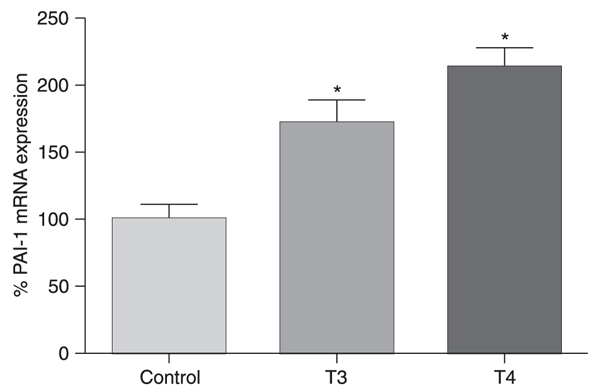Metabolic syndrome is associated with an increased risk of developing cardiovascular diseases and Plasminogen activator inhibitor 1 (PAI-1) overexpression may play a significant role in this process. A positive correlation between adipose tissue gene expression of PAI-1 and its serum concentration has been reported. Furthermore, high serum levels of thyroid hormones (T3 and T4) and PAI-1 have been observed in obese children. The present study evaluates the impact of thyroid hormone treatment on white adipose tissue PAI-1 gene expression and its serum concentration. Male Wistar rats (60 days old) were treated for three weeks with T4 (50 µg/day, Hyper) or with saline (control). Additionally, 3T3-L1 adipocytes were treated for 24 h with T4 (100 nM) or T3 (100 nM). PAI-1 gene expression was determined by real-time PCR, while the serum concentration of PAI-1 was measured by ELISA using a commercial kit (Innovative Research, USA). Both the serum concentration of PAI-1 and mRNA levels were similar between groups in retroperitoneal and epididymal white adipose tissue. Using 3T3-L1 adipocytes, in vitro treatment with T4 and T3 increased the gene expression of PAI-1, suggesting non-genomic and genomic effects, respectively. These results demonstrate that thyroid hormones have different effects in vitro and in vivo on PAI-1 gene expression in adipocytes.
Thyroid hormones; Plasminogen activator inhibitor 1; White adipose tissue; 3T3-L1


